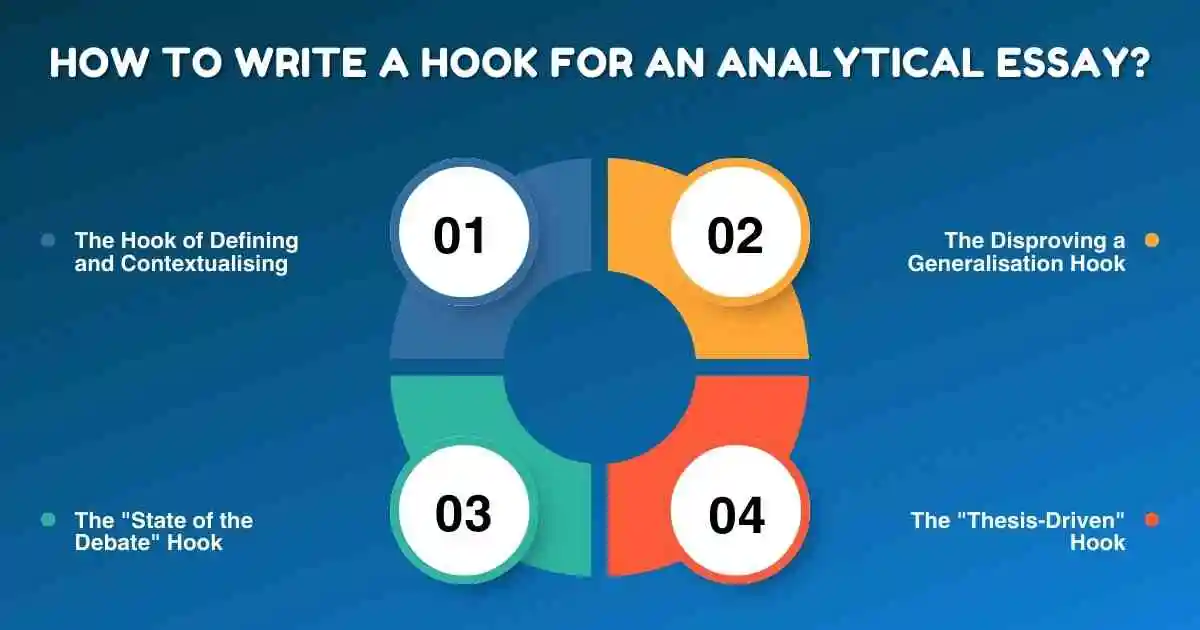How Many References Should You Use in a 3000-Word Essay?
20 references are considered the minimum for a 3000-word essay that indicates an idea about using 1 reference per every ...

Let me guess, you've been assigned to write an analytical essay and you don't have any idea how to write one. But now that you are here, you do not need to worry, as we are among those who have been helping students with their assessments for more than 13 years. After going through this blog, you will be able to write an analytical essay that will help you score good grades.
This blog will clear all your doubts related to analytical essays, as here we will teach you learn everything to make an exceptional analytical essay. You can trust every single information that is shared in this blog, as we collected this information from tutors, university guidelines, and expert essay helpers.
Here you will learn, meaning of an analytical essay and its purpose. Then we will discuss our main part, that is, how to write an Analytical Essay step by step. We have also mentioned some amazing tips on how you should write your essay, which can help you as a guide to score good grades. Here, we have also mentioned how to write a conclusion for an analytical essay and how to write a hook for an analytical essay. So, get ready to get appreciated in front of the whole class.
An analytical essay is defined as an essay that provides an analytic treatment of something. Some of the divisions that can write analysis papers are politics, music, art, events, historical events, scientific research, works of literature, and philosophy. Analytical essays tend to occur in learning institutions, and they also occur in magazines, newspapers, academic journals, and industrial journals. An analytical essay may be good at explaining and putting simple information in perspective to help a reader.
Read Also:- How to Write an Essay Plan for University?
Analytical essays serve two purposes: to serve the reader and also to serve the writer. The students (high school teachers and college professors) are provided with analytical papers to become writers and thinkers. Analytical articles will build up the writing skills of a learner and add to his/her knowledge of a certain topic.
The readers are also assisted by the analytical essays. Analysis essays of criticism are often released in newspapers and magazines so that readers of this publication can make meaning out of the news of the day. Other citizens, the author of which may be in the field, use such essays to educate other people about politics, economy, art, architecture, culture, and many other matters of concern.
Good analytical essays are well-grounded, properly organised around a central point, answer counterarguments, and are highly supported by primary and secondary sources. This step-by-step procedure for writing an analytical essay is collected from professional essay writing services. There is no one better for understanding how to write an analytical essay than someone who does it regularly.
No matter where you intend to base your main argument, be prepared to base your entire analytical essay on one thesis statement.
Write a thesis statement plus a paragraph of introduction: An introduction is essential in catching the eyes of your readers; hence, be mindful of your opening paragraph. Introductions The introductions work best when they have a hook, i.e., some rhetorical question or statement that is bold and provides you with a global picture of what you will answer in your analysis. A thesis statement should come at the end of the introduction, as it serves as the north star of the entire essay.
After your introduction paragraph, divide your essay into body paragraphs, which elaborate on some of the items. Each body paragraph should serve the general purpose of arguing your thesis sentence and could be in the form of background, further discussion or opposing view. The number of body paragraphs that you would have will depend on the size of your essay. The structure of your essay is as important as your essay subject and, as such, you ought to take time planning each body paragraph.
There will be many paragraphs in your essay, so make sure that the paragraph you write starts with a clear topic-related sentence. The start of the paragraph should give a hint of what you are going to talk about in that paragraph. In an essay, there are no headings, so this is your only option for mentioning what you will be discussing.
The main body of the essay has to be stuffed with content and commentary. Your audience will not be convinced without evidence to back your statements. This way, you will be able to support all your points with valid evidence that you have collected from secondary or primary sources. Remember, footnotes and endnotes are necessary.
When you take into consideration another opinion, you can strengthen the argument. But you may not wish to adopt a critical point of view, and yet you can use a body paragraph to clarify that argument. And at that point, you can counter that argument with additional evidence and argument to support your thesis.
Summarise your analysis in a concluding paragraph: If you have a good grade you wish to get or you just wish to give your reader a pleasant reading experience, you should summarise your point in a closing paragraph at the end of your analytical essay. One ought not to introduce the new evidence in the final paragraph. Rather, it is the bow on your entire article, reminding your reader of your greatest hits and leaving him/her with something to part with, to consider.
The best method of providing an analytical essay conclusion is to paraphrase your thesis statement in another sentence, then proceed to provide a summary of your main thesis in a closing paragraph, and finally leave a parting thought of why your analysis mattered or what larger effects your work will produce on the world. Never add new material or points, but attempt to provide some feeling of closure by trying to tie your individual discoveries to a larger scale.
Key Steps to compose your conclusion
1. Reiterate Your Thesis
Could you paraphrase the thesis statement to the reader to give them a recap of the thesis you have argued? This implies that you have been able to prove your thesis in the entire essay.
2. Summarise the Main Points
Which are the key points or arguments that you summarise in your body paragraphs? This is what you will be analysing, and it simply shows how your evidence is helping you to back your main idea.
3. Stress Importance (The So What):
Could you speak of the larger implications of your findings? The questions to be asked and answered are just to tell you why your analysis matters to the reader, the subject, or a field of study.
Be a Climactic Idea: Have something left in the minds of your readers. This can either be a conclusion, a recommendation to a study or a quotation, or an appeal.

The introduction, in the case of UK university assessment, is not only about grabbing the eye; it is about having a clear road map of where you are academically and providing a clear road map on which you base your argument. Tutors and lecturers desire tunnel vision, a beginning point that makes you aware of what the question is, and you are prepared to attack it.
Do not be overly dramatic or personal hooks. Instead, listen to these more analytic and direct methods:
This hook begins by defining a term or concept appearing in the essay question, so it is clear that you know with certainty what you are going to write about.
Examples: The term of freedom in a post-Enlightenment political meaning is not the same, more delicate and controversial, ideal as that frequently used interchangeably with the idea of the same concept of liberty, and has implications for what can be done within state power and to personal autonomy.
The rationale of such a hook is to put a solid challenge to a belief or a traditional understanding that is widely accepted with respect to your topic. This establishes a critical and argumentative stance at the same time.
Examples: The traditional picture of the Victorian era as a morally puritanical period lacks the social and intellectual dislocation that filled the period, particularly in response to industrialisation and scientific discoveries.
The style contextualises your essay within an already existing scholarly discourse, indicating that there is some critical scholarly debate or a research gap. This shows that you have been well conversant with the literature.
Examples: The concept that the geopolitical tensions significantly contributed to the progression of the public consciousness and to the shaping of the political results has traditionally dominated the historiography of the Cold War; the recent research, however, indicates the opposite, and the cultural exchanges seem to have a bigger role to play in the entire process.
At the very start, the thesis statement in itself is often the hook of the most immediate directness and the most effective impact in many UK universities, undergraduate level in particular. Even this does not raise the question of the core of your essay.
Examples: The essay will argue that neither a single religious nor economic factor caused the English Civil War, but rather it is a combination of the two elements that were not helped by the miscalculation that King Charles I made in his politics.
The analytical essay would have to be organised in writing and detail-oriented in order to produce a good analytical essay. Some of the tips that will ensure you write a well-developed analytical essay are as follows:
In conclusion, if you follow every step for writing an analytical essay, it is neither hard nor confusing. As mentioned in this blog, no matter how complex the assessment is, all you need to do is carry out your assessment step by step. After going through this vlog, you might have understood that the hook of the essay, structure, introduction, and conclusion are not something that you must avoid while writing an analytical essay. Most of the students do not focus on these small things and get low grades. You have examples of how to write a hook for an analytical essay, which makes your job a lot easier. So, grab all your required things and start writing your analytical essay.
A Descriptive essay is basically informative and expository, which seeks to present everything in a detailed form to the readers. Whereas analytical writing is critical and evaluative, in this, you need to evaluate and investigate more to prove the significance of your topic.
The Structure of an analytical essay is the same as essay. You have to start with an introduction, then comes the main body where you need to make all your arguments, and last is the conclusion. In conclusion, do not make the mistake of adding any new information; discuss only things that you have discussed in your essay.
The Best way of starting your analytical essay is to start with a hook that may get the attention of readers. Then state your topic, and then make your thesis statement.
Including first-person pronouns will make you sound biased, and everyone will think that the information is subjective. This is why it is suggested that you use the third person pronounce while writing an analytical essay.
Let's Book Your Work with Our Expert and Get High-Quality Content

Loved reading this Blog? Share your valuable thoughts in the comment section.
Add comment